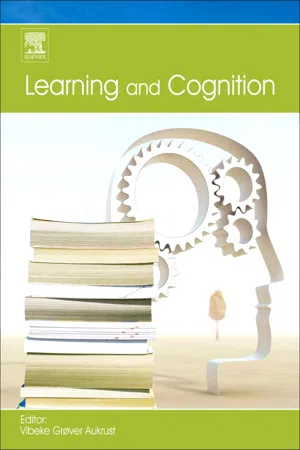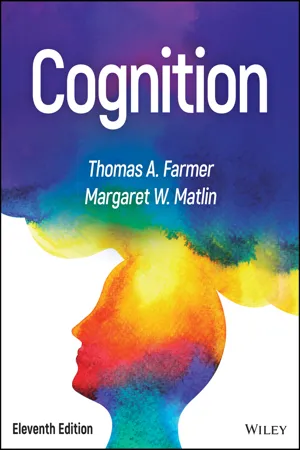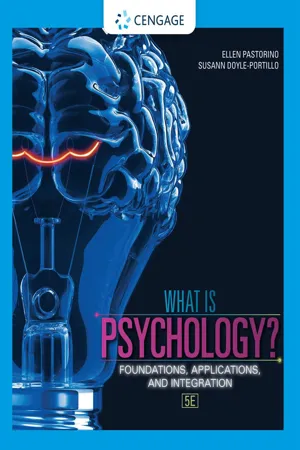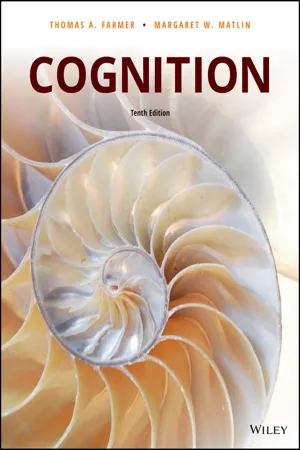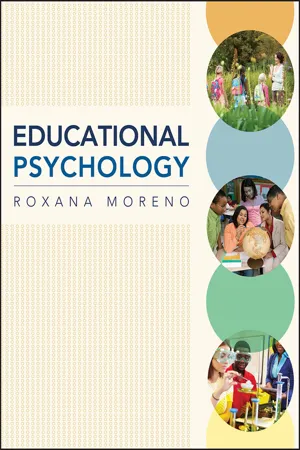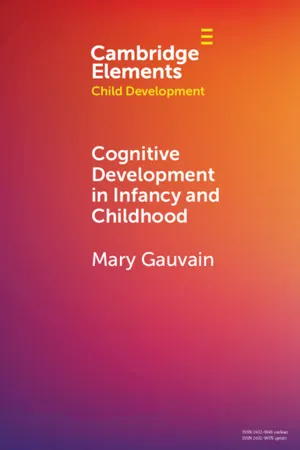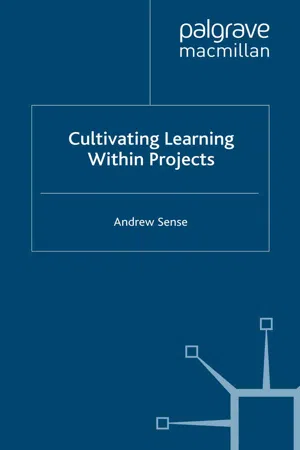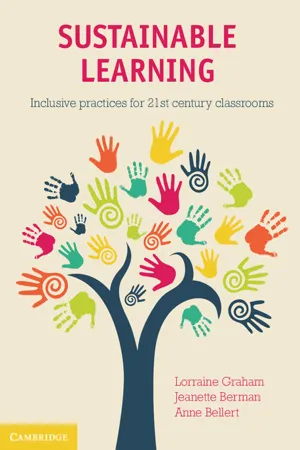Psychology
Cognition and Learning
Cognition refers to the mental processes involved in acquiring, processing, and using knowledge, including perception, memory, and problem-solving. Learning involves the acquisition of new knowledge or skills through experience, study, or instruction. Both cognition and learning are central topics in psychology, as they are fundamental to understanding how individuals perceive, process, and retain information.
Written by Perlego with AI-assistance
Related key terms
1 of 5
10 Key excerpts on "Cognition and Learning"
- eBook - PDF
- Vibeke Grøver Aukrust(Author)
- 2011(Publication Date)
- Elsevier(Publisher)
LEARNING AND COGNITION: INTRODUCTION Cognition: Overview and Recent Trends Neuroscience Bases of Learning Learning in a Cross-Cultural Perspective This page intentionally left blank Cognition: Overview and Recent Trends J Wiley, University of Illinois at Chicago, Chicago, IL, USA B D Jee, Northwestern University, Evanston, IL, USA ã 2010 Elsevier Ltd. All rights reserved. All processes of thought, conscious and unconscious, fall into the realm of cognition. These processes operate by manipulating information-laden mental representations, which are either retrieved from memory or constructed from sensory information. In this way, the mind can be understood as an information processor, continuously adding to its repertoire of mental representations as well as producing overt physical behaviors. The study of human cognition thus becomes the study of the information-processing characteristics of the mind: What is the nature of the representations? How are they manipulated? How much information can be active at once? Cognitive re-searchers are concerned with discovering such facts about cognition, with the overarching goal of explaining human behavior in its various forms. The study of human cognition is relevant to many fields, and researchers from several disciplines have contributed to our understanding of the mind. These disciplines include psychology, philosophy, linguistics, artificial intelligence, anthropology, education, and neuroscience. In fact, many cognitive researchers are multidisciplinary, simultaneously working in a variety of fields, and interdisciplinary, integrat-ing aspects of the different disciplines. The growing field of cognitive science was born out of the perspective that cognitive research must span multiple disciplines. However, less than 50 years ago, the study of cognition was largely considered unscientific, at least among many psychologists in North America. - eBook - PDF
- Thomas A. Farmer, Margaret W. Matlin(Authors)
- 2023(Publication Date)
- Wiley(Publisher)
Cognitive Psychology: Overview The term cognition, or mental activity, refers to the acquisition, storage, transformation, and use of knowl- edge. Cognition is inescapable, meaning that your cognitive processes are always at work. They grant you the ability to recognize and interpret stimuli in your environment and to react strategically to such INTRODUCTION TO COGNITIVE PSYCHOLOGY 2 information. Cognitive processes grant you the ability to plan, to create, to interact with others, and to process the thoughts, sensations, and emotions that you experience. If cognition operates every time you acquire some information, place it in storage, transform that information, and use it . . . then cognition includes a wide range of mental processes! This textbook will explore many of these mental processes, such as perception, memory, imagery, language, problem solving, reasoning, and decision making. As you will see throughout this book, your cognitive processes do not function in isolation from one another. Instead, they work together in intricate and highly coordinated ways to create your conscious (and sometimes nonconscious) experiences. For example, you are performing multiple cognitive tasks simultaneously as your read this paragraph. You are using pattern recognition to create words from an assortment of squiggles and lines that form the letters on this page. You are also consulting your memory and your knowledge about language to search for word meanings and to link together the ideas in this paragraph. Additionally, right now, as you think about these cognitive tasks, you are engaging in another cognitive task called metacognition— you are thinking about your own thought processes. - eBook - PDF
What is Psychology?
Foundations, Applications, and Integration
- Ellen Pastorino, Susann Doyle-Portillo, Ellen Pastorino(Authors)
- 2021(Publication Date)
- Cengage Learning EMEA(Publisher)
229 Foundations in Cognitive Psychology I n previous parts, we covered the scientific foundation of psychology and the biological systems that influence our mental processes and behavior. By now, we hope that you have developed an appreciation for the complexity and importance of our biological systems, especially our remarkable brains. Many psychologists compare the brain and the mental processes of the mind to a computer (the brain) running a software program (the mind). Like a computer, we process, store, and retrieve countless bits of information as we go about our days learning, thinking, speaking, solving problems, and so on. Collectively, these mental processes of the mind are referred to as cognition, or the ways in which we store and use information. We engage in some form of cognition virtually every moment of our day. We store new information as we learn new concepts and behaviors. We use information that we have previously stored when solving problems in our lives. We use stored knowledge in the form of language to communicate with others. Cognition underlies much of our behavior, making an understanding of cognition an essential second foundation of the field of psychology. As we explore cognitive psychology in this part, we will examine what decades of scientific research have taught us about cognition and its influence on our behavior. Chapter 6 describes how our experiences lead to learning that then affects our behavior. In Chapter 7, we will look at memory , the storage, processing, and retrieval of information in the mind. And in Chapter 8, we examine the role cognition, language, and intelligence play in our daily lives. Cognitive abilities such as these play a critical role in our ability to function in life. Well- developed cognitive abilities may pave the way for success in life, whereas cognitive inabilities may make it difficult to meet some of life’s challenges. Both of these situations are illustrated in our case study for this part. - eBook - PDF
- Thomas A. Farmer, Margaret W. Matlin(Authors)
- 2019(Publication Date)
- Wiley(Publisher)
Additionally, we detail the large number of learning features that are built into this textbook. Their design is based on research in areas of cognitive psychology, such as human memory, and will help you to maximize the amount of information that you maintain as you read. An Introduction to Cognitive Psychology AN INTRODUCTION TO COGNITIVE PSYCHOLOGY 2 What Is Cognitive Psychology? The term cognition, or mental activity, refers to the acquisition, storage, transformation, and use of knowl- edge. Although many have argued that nonhuman animals also have cognitive abilities, our focus here is on the inner workings of the human mind. You will likely have the opportunity to learn more about nonhuman animal cognition in other courses offered by the Psychology and Biology departments at your university. Cognition is inescapable. At any point that you are awake, your cognitive processes are at work. They grant you the ability to recognize and interpret stimuli in your environment and to act (or react) strategi- cally to environmental input. Cognitive processes afford you the ability to plan, to create, to interact with others, and to process all of the thoughts, sensations, and emotions that you experience on a daily basis. Your cognitive abilities operate together in intricate and highly coordinated ways to create your conscious experiences. While reading this paragraph, for example, you are performing multiple cognitive tasks at the same time. In order to reach this paragraph, you used pattern recognition to create words from an assortment of squiggles and lines that form the letters on this page. You also consulted your memory and your knowledge about language to search for word meanings and to link together the ideas in this paragraph. Addition- ally, right now, as you think about these cognitive tasks, you are engaging in another cognitive task called metacognition—you were thinking about your own thought processes. - eBook - PDF
- Roxana Moreno(Author)
- 2011(Publication Date)
- Wiley(Publisher)
However, no single event can be claimed to have started the cognitive era. It was the combined work of several influential psychologists since the late 1950s that launched the development of cognitive approaches to learning (Ausubel, 1960; Bruner, Goodnow, & Austin, 1956; Chomsky, 1957; Miller, 1956). Definition of Learning Cognitive views of learning are characterized by their focus on the changes in thought that are involved in learning. They emphasize the mental processes underlying the processing of new information, such as paying attention to an explanation, interpret- ing a graph, or relating new concepts to prior knowledge. Due to this emphasis, cog- nitive theory defines learning as a relatively enduring change in mental structures that occurs as a result of the interaction of an individual with the environment. Unlike behaviorists, cognitive psychologists argue that learning takes place in the mind; therefore, behavior is of interest not in itself but rather as a way to infer whether and how students’ mental structures have changed. Although changing the way that stu- dents think may result in behavioral change, this is not necessary according to cognitive views of learning. Imagine that a student in your class does not know what a mammal is. He does have experience with mammals (e.g., humans, dogs, cats) but he lacks this con- cept in his mental structures and, consequently, is unable to distinguish between mam- mals and other animals. Now imagine that you teach him about the characteristics of mammals. Although the student’s mental structures change after your lesson, his behav- ior may not change until he is called on to use this new information in a certain task, such as classifying a list of animals based on the definition of mammal that he just learned. - Mary Gauvain(Author)
- 2022(Publication Date)
- Cambridge University Press(Publisher)
1 Introduction Human beings live in many different environments and have done so for a very long time. The capacity of humans to thrive in various settings is rooted in cognition, the mental activity through which we acquire and use knowledge. Cognition includes many mental faculties and processes that enable us to access, examine, retain, use, and communicate information. Put differently, cognition is how we think and what we think about, the ability to solve problems on our own and with others, and the capacity to create, understand, and use symbolic and material resources to support intelligent action. The knowledge and cognitive skills that a person needs in a particular environment are not present at birth. They emerge and are shaped by the experiences of life. Cognitive development is the term used to describe the mental changes that occur as children acquire the knowledge and intellectual skills that enable them to understand and act effectively in everyday life. In this Element, I describe cognitive development in infancy and childhood. Early life is a period of tremendous cognitive change. Infants and children acquire a vast array of knowledge and cognitive skills, and they learn to use them to guide action. This Element begins by describing the main theories that guide research in cognitive development. Then I turn to the how and the what of cognitive development. The how is about cognitive change over time. In most contemporary theories, cognitive development is seen as emerging from the dynamic interplay of biological factors and experience with the natural, mater- ial, and social world. Studies of what develops focus on changes over time in mental capacities, knowledge, and skills. This Element describes the develop- ment in a wide range of aspects of cognition: attention, language, social cogni- tion, memory, metacognition and executive function, and problem-solving and reasoning. Cognitive development is simultaneously universal and context-specific.- eBook - PDF
- Julieta Arjona Sumague(Author)
- 2019(Publication Date)
- Society Publishing(Publisher)
Such obstruct notions generally multiply and become a key part of the mental makeup. • Associational Learning: In this, a person has certain mental pictures of his earlier experiences. The person then tries to connect his new associations with his earlier mental images. By using his memory, he recalls his earlier observations. Hence, he comes to accept novel mental images. The Concept of Learning 31 • Appreciation Learning: At this level, attitude and material disposition that are related to the feelings part of the mind come into play. The person starts connecting some meaningful values to the knowledge which has been acquired. • Attitudinal learning: by now, the person has a firm hold over the knowledge acquired and then develops some attitude of mind. Such attitudes are confirmed as the person holds more and more amount of knowledge. b) The Skill Knowledge: This kind of knowledge consists of the sensory motor processes, reading, writing, drawing, musical performance and language learning. 2.4. GENERAL PRINCIPLES OF LEARNING Figure 2.1: Three general principles of learning. 2.4.1. The Value of Effective Metacognition To be capable of guiding own learning in an effective way, people must be capable of evaluating the growth and progress of their learning accurately and must choose those activities that improve learning proficiently. If a student cannot differentiate between what thing he has or has not mastered, and if additional study activities move him no closer to mastery, then the learning is of no use. Metacognition defines the skills and knowledge that people use while monitoring or assessing their own memory and learning. People can work hard to acquire best metacognition just by paying desired attention to successes as well as failures in evaluating what people do and what do not. - Katherine Fogelberg(Author)
- 2023(Publication Date)
- Wiley-Blackwell(Publisher)
Knowledge refers to the construction of higher levels of meaning through the connection of new knowledge and experiences with prior knowledge and experiences (or the creation of new connections between existing prior knowledge), resulting in an individual’s under- standing of information to be developed into concepts and skills. Knowledge may be thought of broadly to include facts, concepts, and events (declarative knowl- edge); skills, behaviors, and procedures (procedural knowledge); and feelings, beliefs, and values (self- knowledge). In addition, the relationship between information and knowledge is iterative; specifically, new information may be processed into a higher level of meaning and thus become knowledge, yet this new knowledge may be considered information at a newer and more complex level, such that further processing may lead to an even greater understanding and thus a new level of more highly connected knowledge. Memory refers to the ability to encode, store, and retrieve information and knowledge, as well as the structures necessary to support these processes. eetion Learning eeorr and Cognition 103 Thus, the concepts of information, knowledge, and memory are, by definition, interrelated. For example, consider a veterinary student attending an anatomy class where they first experience information, such as the basic facts and imagery of anatomy (e.g., direction terms, names, and forms of bones and muscles). This anatomical information becomes knowledge when it is processed – interpreted, organized, synthesized, and integrated – into a more meaningful form (e.g., skeletal and muscular systems, biomechanics). This new level of meaning can serve as necessary information for the development of more advanced meaning making (e.g., diagnosis, surgery, nutrition). A student’s memory then serves to retain their developing information and knowl- edge for later retrieval and use in thought and action.- eBook - PDF
- A. Sense(Author)
- 2007(Publication Date)
- Palgrave Macmillan(Publisher)
In this condition, existing cognitive structures and the knowledge they engender are continually challenged by new knowledge which does not fit, and these structures are eventually reorganized so that new knowledge is better integrated 28 Cultivating Learning Within Projects (Dodgson, 1993). Also, when discussing social learning theory, Bandura (1977) claims that the psychological functioning of an individual is a result of the reciprocal determination between personal character- istics (e.g. mental models, cognitive styles), environmental influences (e.g. social frameworks, political imperatives, physical and psycholo- gical support systems) and behaviour (actions). That is, each of those factors influences the others in an interlocking fashion (Bandura, 1977; Kolb, 1984). These transactions between the person and the environ- ment highlight the interdependency of both the individual and the environment in affecting change, behaviour and learning processes. Specifically, Kolb (1984) describes two dialectically related modes of grasping one’s experience. These consist of apprehension, where one grasps tangible felt experience without any need for inquiry or analyt- ical confirmation, and comprehension, where one grasps an experience by drawing abstract symbolic conceptualizations about it and making the experience communicable between people. He also describes two dialectically related modes of transforming experience, consisting of intention, where one learns the meaning of an experience to oneself by internally reflecting on the experience, and extension, where one actively experiments with the previously grasped experience, that is one actively intervenes in the learning milieu and a new experience results in further movement through the learning cycle (Kolb, 1984). - eBook - PDF
Sustainable Learning
Inclusive Practices for 21st Century Classrooms
- Lorraine Graham, Jeanette Berman, Anne Bellert(Authors)
- 2015(Publication Date)
- Cambridge University Press(Publisher)
(Further strategies for using these tools are discussed in chapter 6.) Research into the process of how learning takes place is ongoing. This develop- ment of knowledge about learning is currently fuelled by the explosion in technology that has allowed monitoring of brain function as the brain is in use, and this has led to many theories that represent different ways of understanding learning. With such a rich base of understanding at their disposal, teachers must develop robust concep- tualisation of what happens for students as they learn, so that instruction can support optimal levels of student engagement and learning. Teachers, as learners themselves, can draw from traditional ways of understanding, as well as from more recent theo- ries and relevant cultural perspectives, in order to make sense of learning and teach- ing. Well-grounded teacher conceptualisations about learning processes can increase the likelihood of successful learning for all students. 43 Chapter 2 Learning processes Further reading Australian Curriculum, Assessment and Reporting Authority. n.d. ‘General capabilities in the Australian Curriculum’. ACARA. www.australiancurriculum.edu.au/GeneralCapabilities/Over view/general-capabilities-in-the-australian-curriculum. Australian Science of Learning Research Centre website: http://slrc.org.au/. Centre for Educational Neuroscience website: www.educationalneuroscience.org.uk/. Cunningham, T., J. Gannon, M. Kavanagh, J. Greene, L. Reddy and L. Whitson. 2007. ‘Theories of learning and curriculum design: key positionalities and their relationships.’ Level 3. http:// level3.dit.ie/html/issue5/tony_cunningham/cunningham.pdf . Educator Network website: http://theeducatornetwork.ning.com/. Gathercole, S. E. and T. P. Alloway. 2007. ‘Understanding working memory: a classroom guide.’ University of York. www.york.ac.uk/res/wml/Classroom%20guide.pdf. The Institute for Habits of Mind website: www.habitsofmindinstitute.org.
Index pages curate the most relevant extracts from our library of academic textbooks. They’ve been created using an in-house natural language model (NLM), each adding context and meaning to key research topics.
